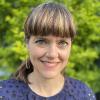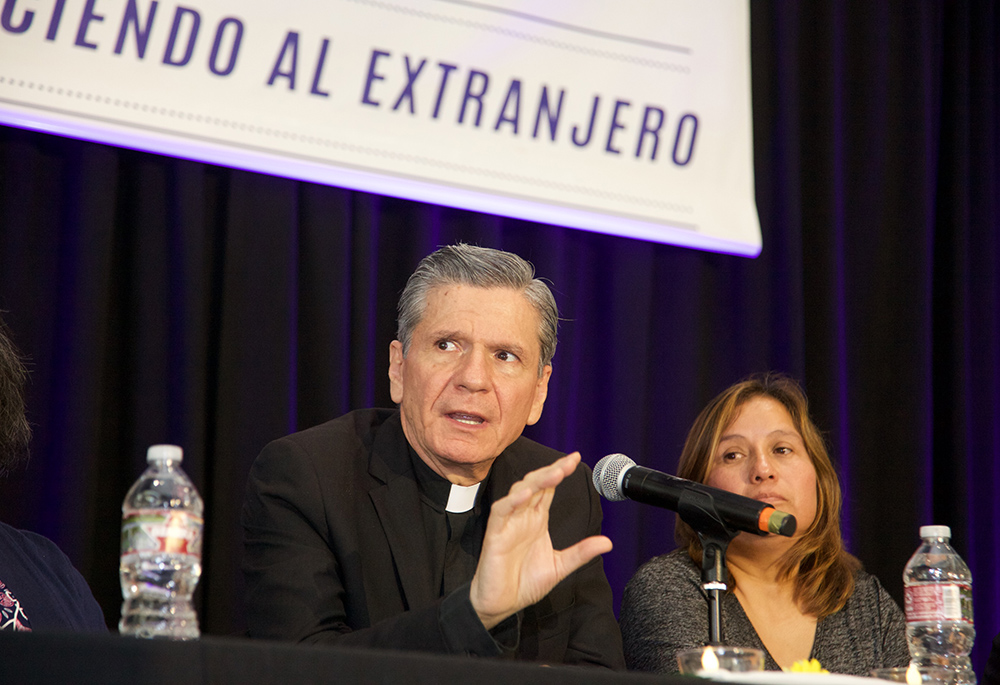
Archbishop Gustavo García-Siller of San Antonio speaks during a recent convocation to celebrate "Recognizing the Stranger," a parish-centered initiative funded by the U.S. bishops' Catholic Campaign for Human Development and implemented by the West/Southwest Industrial Areas Foundation, a network of community- and faith-based organizations. Seated beside the archbishop is Maricela Pineda, who participated in the program. (Courtesy of Alan Pogue)
It was the start of the pandemic and Maricela Pineda, an immigrant from Mexico and mother of five, was worried about many things, foremost her children.
"My kids used to get very good grades, but when school went online the grades started coming down," she said. "And one of my sons had depression. There were a lot of unknowns, and I was scared."
Then Pineda began attending a training and formation program hosted at her Northern California parish, where over several gatherings, sometimes held in the parking lot as a pandemic precaution, she heard other immigrant families' stories.
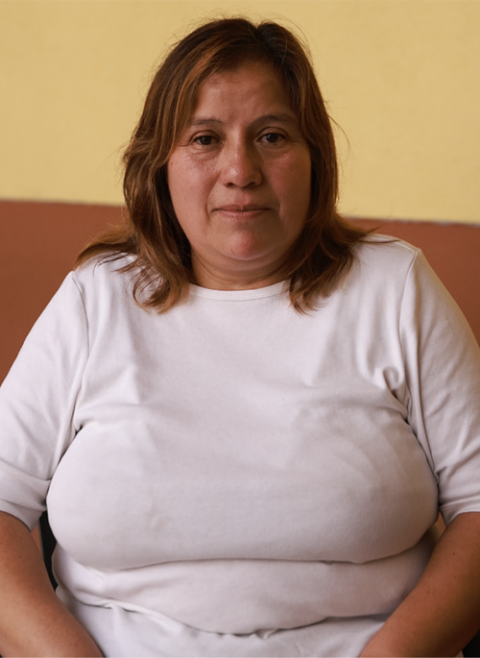
Maricela Pineda, an immigrant from Mexico and mother of five, said Recognizing the Stranger changed her life. "I learned you don't have to go to college, don't have to be a famous person or somebody big; a mom, a student, anybody can do something for their community," she said. (Courtesy of West/Southwest Industrial Areas Foundation)
"People weren't sure if there'd be enough food, they didn't have money to pay rent, their kids had problems," recalled the 52-year-old. "I realized we all had a lot in common."
The meetings didn't stop there. Participants not only listened to one another but also learned to address hardships — pandemic- and non-pandemic-related — in concrete ways.
"We helped around 200 families with rental assistance, filling out forms because some people don't speak English or know how to write," said Pineda, who's now working with city officials to address bullying, violence and other issues in schools.
The California Catholic is one of some 4,000 individuals who has participated in a parish-centered initiative that aims to identify, train and mentor immigrant leaders and to nurture relationships between immigrant and nonimmigrant communities.
Called "Recognizing the Stranger" and first launched as a pilot in 2016, the program has been funded for five years by a grant from the U.S. bishops' Catholic Campaign for Human Development and implemented by the West/Southwest Industrial Areas Foundation, a network of community- and faith-based organizations. The national grant, totaling $500,000, ends this year.
The intent is "for us to help immigrants recognize the church is their church, a place where they can discuss their pains and sorrows and also their joys and to see if there are things we can work on together that help us in our daily lives," said Fr. Tim Luschen, who is involved with trainings in the Oklahoma City Archdiocese.
Pope Francis has expressed support for Recognizing the Stranger, as have many U.S. bishops. Bishop Mark Seitz of El Paso, Texas, the new chairman of the U.S. bishops' migration committee, hopes the model might become a U.S. Conference of Catholic Bishops-endorsed program that is further developed and replicated in additional dioceses.
"It's something that really needs to happen throughout our country," Seitz said.
Bishop Mark Seitz of El Paso, Texas, is seen Feb. 26, 2019, at the U.S.-Mexico border wall holding photos of two migrant children who died in U.S. custody. (CNS/David Agren)
Scripture, sacraments, action
At a convocation Feb. 28-March 1 in San Antonio to celebrate the initiative, Luschen addressed the 300 attendees — a mix of community organizers, clergy, immigrant leaders and six Texas bishops, among them Seitz, Archbishop Gustavo García-Siller of San Antonio and Cardinal Daniel DiNardo of Galveston-Houston, former president of the U.S. Conference of Catholic Bishops.
(Los Angeles Auxiliary Bishop David O'Connell, who was murdered in his home this February, was a longtime supporter of West/Southwest Industrial Areas Foundation, or IAF, and played a key role in Recognizing the Stranger. The convocation included a video to commemorate his life.)
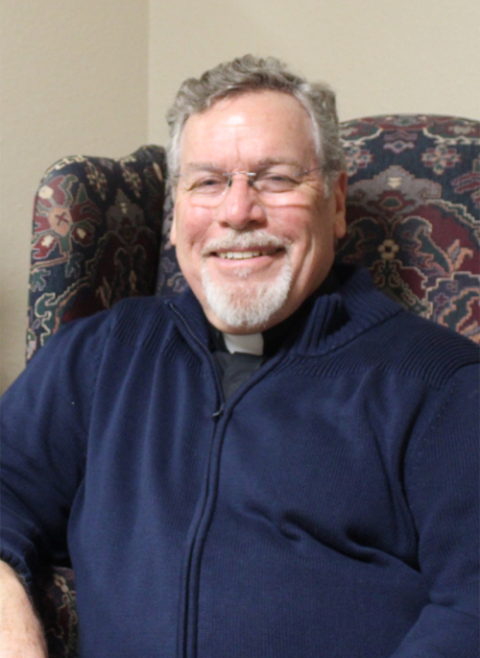
Fr. Tim Luschen, pastor of St. Charles Borromeo Church in Warr Acres, Oklahoma, is a community organizer with Voices Organized in Civic Engagement, or VOICE. He said participating in Recognizing the Stranger has made him a better priest. (Courtesy of Fr. Tim Luschen)
Since the formation program commenced, there's been "nativism, growing tensions on the border, polarized politics, the COVID-19 pandemic, a major economic recession and gun violence," said Luschen during the convocation. The new program responded amid it all by fulfilling the pope's call "to listen to others, to see others."
"I believe this is exactly what it means for us to be a eucharistic community, going out to the peripheries, seeing the ones who are struggling, moving closer to them, listening to them, accompanying them," the priest said.
Recognizing the Stranger has looked somewhat different in various regions and evolved over time, particularly during the pandemic. But in all dioceses the Catholic Campaign for Human Development national grant pays for West/Southwest IAF-trained organizers, in partnership with local West/Southwest IAF affiliates and church leaders, to lead sessions for local immigrant parishioners.
The pilot was in seven Southwestern dioceses, with the program expanding to a total of 20 episcopates. Trainings have been held throughout Texas and in New Mexico, Arizona, Nevada, Oklahoma, Colorado, California, Montana, Iowa, Louisiana, Oregon, Nebraska, Michigan and Arkansas.
Initially participants were nearly all immigrants from Mexico and Central America, but organizers learned early on it was beneficial to invite the wider parish community. Sessions then moved from being in Spanish to being bilingual, thus fostering relationships between the immigrant and local community, said Joe Rubio, national IAF co-director for the West/Southwest.
'I believe this is exactly what it means for us to be a eucharistic community, going out to the peripheries, seeing the ones who are struggling, moving closer to them, listening to them, accompanying them.'
—Fr. Tim Luschen
The two-day trainings, drawing 60 to about 200 people from numerous parishes, feature large group gatherings interspersed with smaller breakout sessions.
Parishioners first are invited to focus on church documents, Scripture and the sacraments, especially baptism.
"Baptism doesn't stop at the border," Rubio told NCR. "We are part of the same body, and in parish life it doesn't matter whether you have legal documentation or not. Being a baptized member of this community means we have claims and responsibilities to each other."
Next the trainings put the study of Scripture, tradition and the sacraments "all together with concrete tools to analyze how their community is doing and what it needs," said Rubio, adding, "this is not a one-time thing but an ongoing process."

Joe Rubio, national IAF co-director for the West/Southwest, speaks during the recent convocation in San Antonio celebrating five years of the formation and training initiative focused on immigrant communities. (Courtesy of Alan Pogue)
Creative solutions and 'humanizing spaces'
Industrial Areas Foundation has a long history of partnering with Catholic parishes to address social justice issues. The Recognizing the Stranger strategy, however, "created a way to work with immigrant communities within parishes in a much broader way than ever before," Rubio said.
It has empowered immigrants to mobilize for emergency relief after storms and organize "know your rights" events. After the shooting in Uvalde, Texas, they convened small gatherings for people to process their devastation.
In Los Angeles, parishioners worked with IAF leaders to advocate for the expansion of the California earned income tax credit to undocumented workers with young children.
"It was not an act of charity but a pathway to dignity for essential workers and undocumented families," said Sheila Thomas of One LA-IAF during the convocation.
One of the earliest trainings was held in the Dallas area in 2017, as the Trump administration cracked down on undocumented migrants and the Texas Legislature passed a law allowing police to inquire about the immigration status of anyone they arrested or detained, including during routine traffic stops.
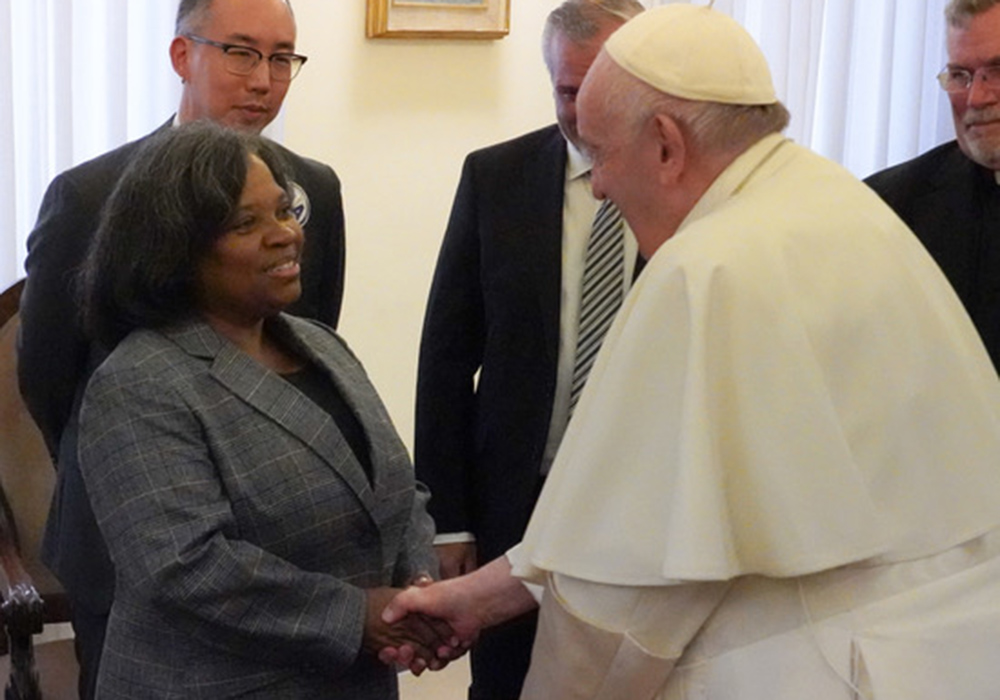
Sheila Thomas meets Pope Francis during fall 2022 at the Vatican. Thomas, with West/Southwest IAF affiliate One LA-IAF, was part of a delegation of community organizers and faith leaders who spoke with the pontiff about Recognizing the Stranger and their work with the first phase of the ongoing synod. (Courtesy of Rabbi John Linder)
"We were seeing pervasive fear," recalled Josephine Lopez Paul, a lead organizer with COPS/Metro, the IAF affiliate in San Antonio. Immigrants were afraid to drive or take their kids to school — or to report crimes.
"The year before registration for CCD was over 1,000 and it dropped to 200 because people were afraid to register their kids for class," Lopez Paul said.
So the IAF affiliate Dallas Area Interfaith and immigrant leaders worked with bishops and local police chiefs and officials to create a parish identification card program. The cards provide a way for people to identify themselves, regardless of their legal status.
The model went on to be replicated in San Antonio and the Rio Grande Valley.
"The parish ID cards made just a huge, huge difference both in parishes in terms of building solidarity and understanding but also giving immigrants the freedom to live and be without fear of being deported," said Lopez Paul.
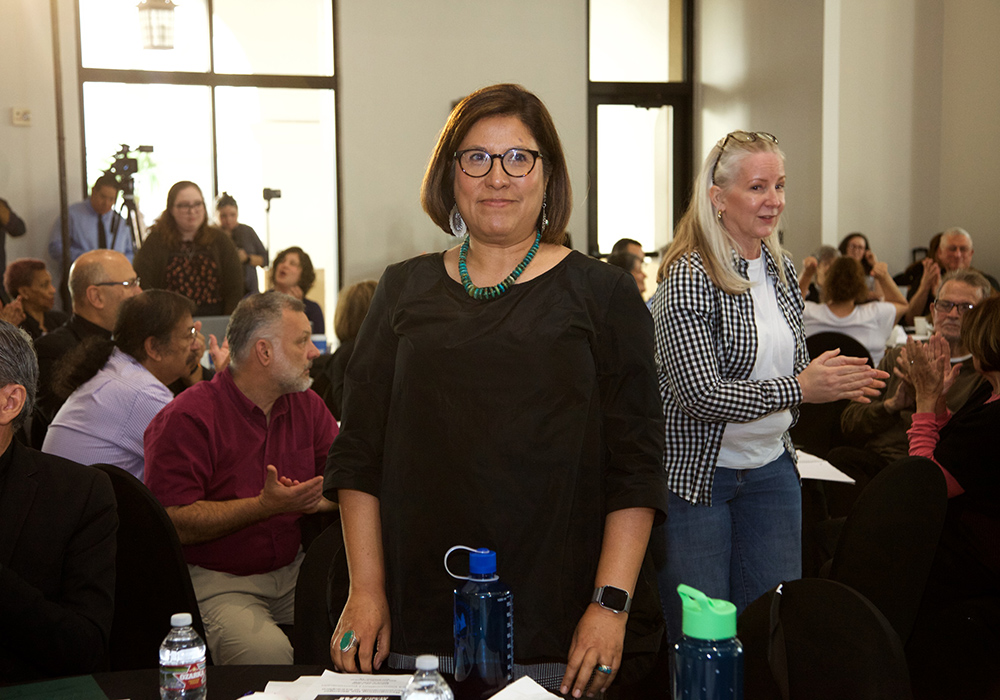
Josephine Lopez Paul, a lead organizer with COPS/Metro, the IAF affiliate in San Antonio, is pictured at the convocation. The event last month drew a mix of community organizers, clergy, immigrant leaders and bishops. (Courtesy of Alan Pogue)
García-Siller described how border policies can exacerbate tensions between immigrants and nonimmigrants. He highlighted a recent proposal by Texas lawmakers that would make it a state felony to cross the border into the United States from Mexico without authorization and establish a new border police force empowered to deputize private citizens.
Because San Antonio is so close to the border, there is an overall culture of welcoming immigrants, said the archbishop. "But policies like this affect migrants because they make people who are against migrants and refugees feel they are in the right."
At the convocation, Lorraine Gonzales from the San Antonio Archdiocese described how initially the "cultural division was so strong" at her parish that during one function "some people covered their ears during the Spanish interpretations."
Recognizing the Stranger is a way "communities can become more humanizing spaces for people," García-Siller said.
Seitz, who's voiced criticism of President Biden's strict asylum restrictions, sees Recognizing the Stranger as helping shift the narrative in the United States "from one that engenders fear of the other — that view the immigrant as someone we don't know, characterizes them in broad terms as invaders, criminals and rapists — and brings us closer to the reality that those who are crossing the border are members of families — mothers, fathers, children."
"The interesting thing about it," said the bishop, "is that this false narrative is overcome when there's the opportunity to meet the stranger."
Advertisement
'Anybody can do something'
When the pandemic hit, Recognizing the Stranger "had to speak to the moment," said Rubio. The trainings were adapted and shifted to Zoom. "We looked at what Scripture has to say about living in a time of crisis," he said.
Rubio recalled the painful impact of the health crisis on border communities. "It was just brutal," he said. "Hardly a family was not affected by death. Not only immigrants, but poor and working folks."
One of the gifts of Recognizing the Stranger, said Rubio, was that parishes that began the trainings pre-pandemic "were connected in ways that many of us had not been."
"They were able to reach out and support each other in a fabulous manner, first for just connection and mutual support when they needed it. And then to act politically around eviction issues, access to the vaccine, rental and food assistance."
In 2021, as the first phase of the worldwide synod got underway, West/Southwest IAF began to assist with the synodal process — helping train local Catholics to carry out listening sessions in their parishes. The Recognizing the Stranger structure was particularly well-suited to support and assist with the process, said Rubio.
García-Siller said Recognizing the Stranger and the synod did not overlap but rather "complemented one another." The former helps organize people and the latter "is a spiritual journey."
Yet both are infused with a spirit of synodality, said the archbishop.
"We can't continue the way we have been as a church, not responding to the needs of today," he said. "People need to connect, to listen, to see other human beings as their brothers and sisters."
Last fall the pope met with a delegation of West/Southwest IAF organizers and faith leaders at the Vatican, where they discussed organizers' role in the synod and Recognizing the Stranger. For the recent convocation in Texas, Francis recorded a nearly 4-minute video.
"My heart rejoices when I see the pastors, priests and laity — leaders in their communities — together with civic organizations meet to discuss the best ways to overcome serious situations of injustice suffered by the excluded," said the pontiff in Spanish. "I encourage and strongly urge you to continue to do so."
Rubio said the convocation "opened doors with local dioceses" about possible formation or training programs for clergy, seminarians, deacons or laity that would help institutionalize Recognizing the Stranger after the grant ends.
If Seitz's dream is fulfilled, the bishops' conference will undertake a version of the effort on a larger scale.
Ralph McCloud, Catholic Campaign for Human Development's director, said the ultimate success of the initiative will be "in how communities are changed going forward, how parishes are enriched and enlivened, and how leadership is developed from generation to generation."
Luschen said his involvement in community organizing and Recognizing the Stranger has helped him be "a much better priest and see that this is what a parish should be all about."
"I feel like my Catholic faith is more alive today than it's ever been," he said.
In California, Pineda feels the program changed her life.
"I learned you don't have to go to college, don't have to be a famous person or somebody big; a mom, a student, anybody can do something for their community," she said. "Sometimes we don't realize how powerful our faith is until we are in a situation where we can listen to one another and really help those in need."
